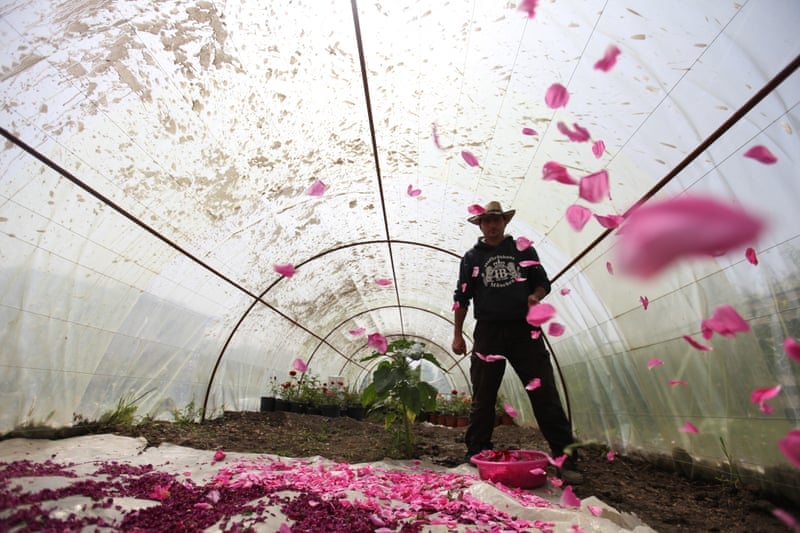When the plastic bucket is filled with roses, Nahla al-Zarda takes it into the kitchen, where she separates the petals from the buds. She soaks them in boiling water, which blushes pink.
“I love this colour. It will be even stronger when the drink is ready,” she says.
Her husband, Salem al-Azouq, a man in his mid-40s, is out picking in the small field behind his house, which is filled with roses of the same shade.
“There was nothing here when we came five years ago. It looked like that,” he says, pointing to the wheat plantations on either side of the plot.
It is six years now since they came to Lebanon, and five years since they moved to the makeshift house at the edge of the plantation. Before that, they were in a refugee camp, like many of the 1 to 2 million Syrians in the country.
Al-Azouq works quickly and with ease. He only picks large buds, leaving the smaller ones for later. Now, during the season, he harvests two or three times a week, preferably in the early morning.
“That is the best time. The rose is still asleep, holding on to its fragrance,” he says.
Behind his back, in the far distance, lies the mountain range separating Lebanon from Syria. Al-Azouq’s home village is beyond those mountains, in a farming area near Damascus.
He started coming to Lebanon in 2006 for seasonal work, just like hundreds of thousands of other Syrians. It was always in cultivation: roses and trees were his speciality. Then, the war came. The couple, with their small twin daughters and baby son, fled.
“We had just spent all our savings on building a house. Nothing is left of it now. You don’t even hear birds singing in our village today,” says al-Azouq.
His youngest son, two-year-old Ahmad, follows his father through the field. When they pass by a tap and buckets being filled up, he stops to play with the water. Al-Azouq points to the different things he grows: red and white roses for people’s gardens, trees about to bear fruit, rosemary, basil and lavender. But the star is a bright pink rose with a fragrant smell, the one he was picking earlier.
“It’s the sultani, the best kind of rose. No other has the same strong flavour,” he says.
For the rose growers of Lebanon and Syria (lands that gave name to the Damascus rose, cherished by Shakespeare, the Babylonians and ancient Egyptians), this is what ultimately matters. Most of their roses go into making one of the most significant culinary products in the region: rose water.

This scented liquid, still produced with the same distillation technique that 11th-century medical scholar Ibn Sina invented, is used in a range of Middle Eastern recipes. Lebanese and Syrians add it to their cheese dessert kanafeh, as well as their date cookies and syrupy baklava. Turks and Iranians flavour ice cream and Turkish delight with it; Indians their lassi.
Sweets aside, rose water has always had an important place in folk medicine as well, and is used for ailments including digestive issues, high blood pressure and insomnia.
“For us, it is part of our tradition of mouneh, preserving food for the winter. This is how we capture the flavours of the season,” says Lebanese food writer Barbara Massaad.
The couple do not produce rose water themselves – they do not have the equipment, and al-Azouq’s expertise lies in cultivation and growing. They sell to others in Lebanon doing distillation, both in the Bekaa Valley and on the coast.
Despite the history that Lebanon shares with Syria, and the many family ties that cut across the border, anti-Syrian attitudes have been growing in the country. Refugee settlements have been raided and families evicted, and municipalities have imposed curfews on Syrians.
“Families are not allowed to leave the camps without a permit, not even to buy water or see the doctor,” says Doha Adi from the organisation Sawa for Development and Aid.
After several years of extending great hospitality to Syrian refugees, Lebanon has been struggling with an economic crisis and foreign minister Gebran Bassil recently made anti-refugee statements on Twitter and in speeches.
“This way, people are steered towards blaming refugees for their worries, even when they have nothing to do with it,” says Adi.
Cultivating roses, al-Azouq and al-Zarda work in one of only three sectors legally open for Syrians: agriculture, construction and waste management. They pay rent for their land, as all refugees do, including the majority of those living in camps.
“The flowers we grow are from Syria. We brought seeds with us when we left,” says al-Azouq.
He stretches out his hand to pick a rose and almost grabs hold of a bee – but that is OK, he says, he usually gets stung once a day.
“I am happy for the bees. They are a sign that the fields are healthy.”
Al-Azouq brings two-year-old Ahmad into the kitchen. He is about to go and pick up the other children from school, then pass by the organic farm he runs together with other Syrians, Lebanese and a French brother and sister. Using natural techniques, they aim to protect the biodiversity of the region, not least species that have suffered from the war in Syria. They cultivate a range of fruits and vegetables there – but no roses. These are reserved for the family’s backyard.
The Guardian
















Comments About This Article
Please fill the fields below.